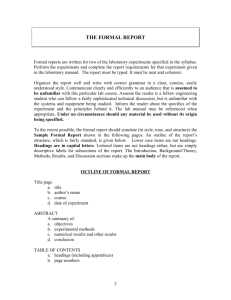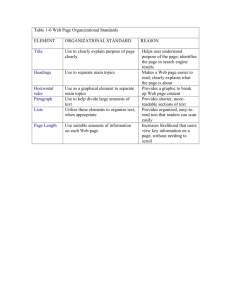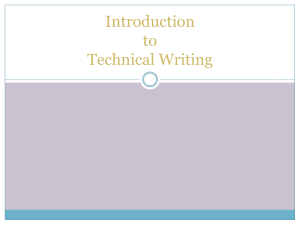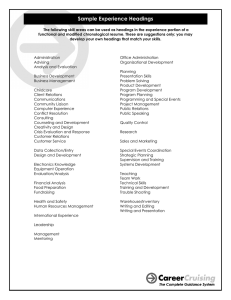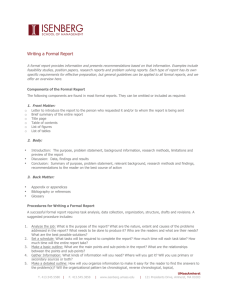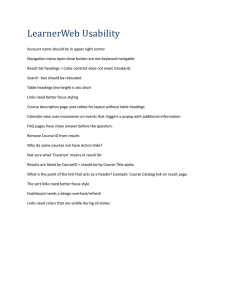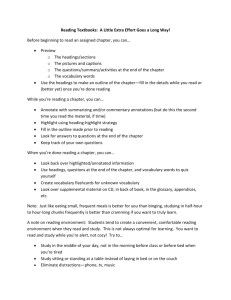8-report writting
advertisement
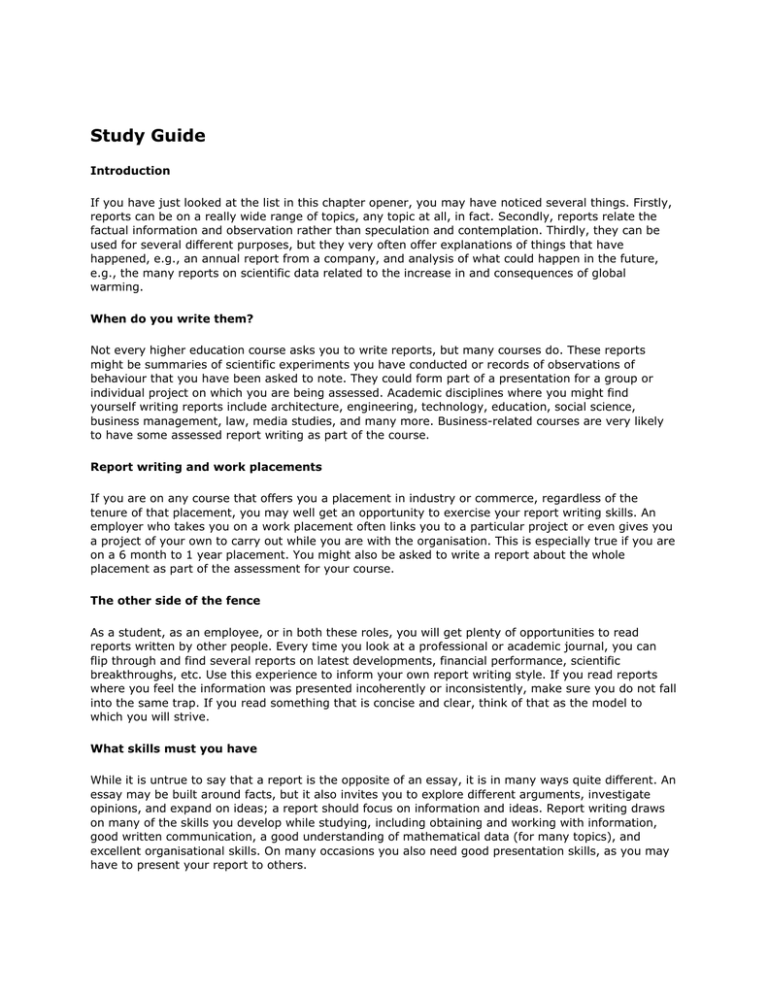
Study Guide Introduction If you have just looked at the list in this chapter opener, you may have noticed several things. Firstly, reports can be on a really wide range of topics, any topic at all, in fact. Secondly, reports relate the factual information and observation rather than speculation and contemplation. Thirdly, they can be used for several different purposes, but they very often offer explanations of things that have happened, e.g., an annual report from a company, and analysis of what could happen in the future, e.g., the many reports on scientific data related to the increase in and consequences of global warming. When do you write them? Not every higher education course asks you to write reports, but many courses do. These reports might be summaries of scientific experiments you have conducted or records of observations of behaviour that you have been asked to note. They could form part of a presentation for a group or individual project on which you are being assessed. Academic disciplines where you might find yourself writing reports include architecture, engineering, technology, education, social science, business management, law, media studies, and many more. Business-related courses are very likely to have some assessed report writing as part of the course. Report writing and work placements If you are on any course that offers you a placement in industry or commerce, regardless of the tenure of that placement, you may well get an opportunity to exercise your report writing skills. An employer who takes you on a work placement often links you to a particular project or even gives you a project of your own to carry out while you are with the organisation. This is especially true if you are on a 6 month to 1 year placement. You might also be asked to write a report about the whole placement as part of the assessment for your course. The other side of the fence As a student, as an employee, or in both these roles, you will get plenty of opportunities to read reports written by other people. Every time you look at a professional or academic journal, you can flip through and find several reports on latest developments, financial performance, scientific breakthroughs, etc. Use this experience to inform your own report writing style. If you read reports where you feel the information was presented incoherently or inconsistently, make sure you do not fall into the same trap. If you read something that is concise and clear, think of that as the model to which you will strive. What skills must you have While it is untrue to say that a report is the opposite of an essay, it is in many ways quite different. An essay may be built around facts, but it also invites you to explore different arguments, investigate opinions, and expand on ideas; a report should focus on information and ideas. Report writing draws on many of the skills you develop while studying, including obtaining and working with information, good written communication, a good understanding of mathematical data (for many topics), and excellent organisational skills. On many occasions you also need good presentation skills, as you may have to present your report to others. Begin by asking a question If you have to write a report, before you do anything else, ask yourself the important question “Why am I writing this report?” Not counting the answer that you have to because it is an assessed assignment, what are you actually being asked to do? Reports may provide information, e.g., an accident report for a health and safety department. Reports may make a request, e.g., the justification for buying an expensive piece of scanning equipment for a hospital. Reports may seek to influence decision making, e.g., a proposal to launch a new product, or to solve a problem. Then ask a few more questions As a student, your written reports are usually expected to providing information, unless you get involved in student committee work of some kind. Whatever the topic and the aim of the report, there are a few further questions for you to consider. What subject matter will you really have to address? Think about the topic and the main themes you need to address. This will influence your information gathering. Who is the intended readership for your masterpiece? At college or university, the readers are most likely to be tutors and lecturers, though sometimes fellow students form part of your audience. But in a work situation ... At work, your reports may be of many different types, e.g., providing information, making requests, influencing decisions, and solving problems. In these situations, you have to think carefully about your intended readers. What do they already know about the subject? What do they need or want to know? What are their opinions on the subject and is your report likely to confirm or challenge those opinions? How do they prefer material to be presented; some people likely brevity, some prefer more indepth reports. Being able to answer these questions can really contribute to a successful result for you. Nearly at the starting line Before you start work, there are two more things to consider. Firstly, what constraints are you working under, e.g., the deadline, the resources available to you, and whether you need to collect any primary data (see Chapter 9 (should chapter references be included as they aren’t used to organise content in the CWS? Consider rewording) on researching and obtaining information)? Secondly, consider the terms of reference for the report. What is its scope? Terms of reference indicate how you intend to achieve your objective. They outline the aspects you intend to consider and the limitations you intend to observe. It is really important to get the terms of reference right and if you have concerns at this stage, talk to a tutor. Preparation The main part of this is researching and organising information (see Chapter 9 (should chapter references be included as they aren’t used to organise content in the CWS? Consider rewording) on researching and obtaining information. It is impossible to set a strict rule about how much information you should collect for your report, since this varies so much between both the topic covered and the terms of reference of your report. When you are collecting data, go through the following checklist: Are the facts accurate? Have you separated facts from opinion? Are the facts separate for inferences? Have you selected only relevant information? Have you left out important information, in order to be brief? If you have, think again. Be organised Once you have gathered all your material, start planning the structure of your report. Try following these suggestions. Make a list of the major points you intend to cover. Break these down into smaller points with appropriate headings. Under each heading, list the facts, figures, and anything else useful. Alongside these headings note the information that you used to gather this material. Mark the least relevant and most marginal points; you can probably reject these, especially if you are trying to be brief. The material looks less daunting when you have organised it like this. Putting it on paper Not every report is going to have exactly the same sections because of the variation in topic, but there are some standard guidelines that are useful for planning most reports. While you want to avoid complicated systems of endless subheadings with ordinary numerals, Roman numerals, and capital and lower case lettered headings with endless cross references and sub headings, you do not need to decide on a numbering or lettering system that is appropriate. At college or university, you may be given instructions about this. At work, there is usually a house style to follow. The basic structure First of all you need a title page. This should include the title of the report, the author, and the date. In employment situations, you should also include a distribution list. Do not make this page look too fussy; basic clear information is what is required. After the title page comes the contents page. This should list the main headings, subheadings (if you are using any), and any appendices. This is followed by a crucial section, the abstract or summary. Either word will do. Summary sounds less academic, but sounds a bit more like an ending. Take your choice or follow guidelines if you have any. The importance of a good abstract It is worth paying real attention to this, because it is what people will read to decide whether they are interested in ploughing through the rest of the report. It sums up the main points and helps readers understand why the report was written. An abstract or summary should include: the purpose and scope of the report background information to set the scene what has been done and how the main findings the conclusions the recommendations Not all these sections are always appropriate. Many reports you write as a student may not contain a recommendations section, for example. Restoring order Having paid special attention to the abstract, let us return to the overall order of the report. After title, contents, and abstract comes the introduction. This sets the tone and gives the reader an idea of the overall style. If you can find a clever way to draw people into a topic, this is the place to do it. Following the introduction, you should include any procedures or method if these are relevant; if you have conducted experiments or surveys, for example. If you had any difficulty obtaining all the information you wanted, you should also explain these under this heading. The main event The main body of the report outlines your findings. This is the section where you may need to use some sub-headings in addition to your main headings. Try to keep individual paragraphs and sentences nice and short so that readers are not confronted by great chunks of text. Here are a few suggestions for the main body of the report. Develop ideas. Consider different aspects of a problem. Make your reasoning clear to the reader. Explain and justify the points you have made. Keep your writing focused by constantly referring to the terms of reference. The C words The conclusion to a report is really important. Many readers look at the abstract, the introduction, and the conclusions before they refer to anything else. You do not want your conclusions just to fizzle away into nothing. Once you have read your conclusions to ensure that they are clear, concise, consistent, considered, and coherent, you need to ask yourself another question, “Is it reasonable to draw the conclusions I have arrived at from the material contained in the rest of the report?” Final touches If it is a report that contains recommendations, these should follow your conclusions. Once again, it should be clear to the reader that the facts and information contained in the report link directly to the recommendations. It is easy to be very clear about what you want to recommend. Sometimes it is more difficult to ensure that these recommendations are obvious to everyone else. Last of all come any references, bibliography of relevant material, and appendices containing any diagrams, tables, or other scientific data. It is important to link any appendices by whatever lettering or numbering system you have used to the report. Read it all one more time Go back to your early questions, i.e., who is going to read this report and what will they already know about the topic? What views do they already have on it? Put yourself in their shoes as you read and check that your report makes sense and that it does not contain jargon that will be meaningless to your reader. You may be utterly sick of the sight of this report by now, but this final check is worthwhile. As a student, you want to get great marks. In employment, a good report could mean better resources for your department or even a promotion for you! Report writing and your job search You might be relieved to read that report writing does not often form a direct part of the recruitment and selection process for new graduates getting into the job market. Note the use of the word “often” rather than “never”. Many large organisations have complex selection procedures that may involve testing you on many work-related activities. You might, for example, be given various pieces of information and asked to draw them together into a report or you might be reading various reports to extract factual information. Even without these nightmares, it is always worth highlighting your report writing skills on your CV. At work Writing reports is not restricted to a few professions. Whether you are in business, education, social care, technology, or science, you will often find you have to write a report about something. It could be technical issues, the write-up of a training session, a proposal for additional funding, a summary of a project, the marketing projections for the following year, and a hundred and one other things. This report writing can be time-consuming when you are still doing the rest of your job, but if you have developed good skills in how to communicate this kind of information, you will save yourself a lot of time.
